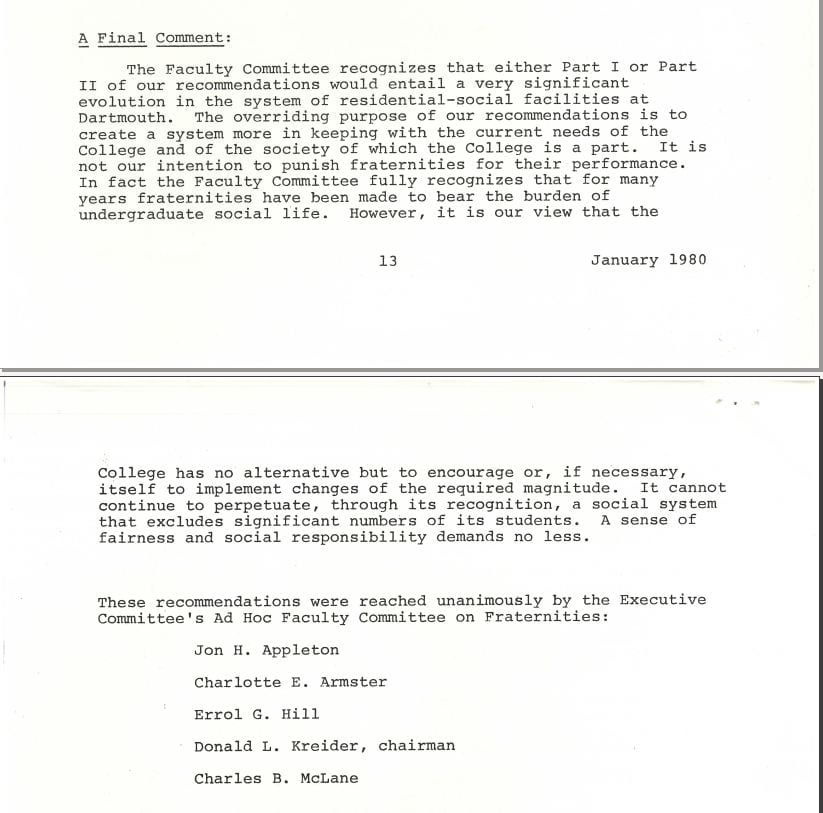In November 1978, at a meeting of the faculty, Professor James Epperson made a controversial proposal: that all fraternities and sororities at Dartmouth College be abolished.1 The night was full of impassioned debate: some faculty spoke for the motion, and some spoke against it. Students came out, too, and spoke for both sides. In the end, Epperson’s proposal won out, and the faculty voted 67-16 in favor of abolishing the fraternity system.2
Pro-fraternity speakers at the meeting had argued that fraternities provided the College with “brotherhood, community services and social life.”3 But those in favor of ending the system believed that “brotherhood” was no longer enough. The campus looked different from how it did when its first Greek organizations were established in 1842,4 and people were beginning to question why “bastions of white male dominance”5 were still allowed to control the social scene. Women had by then attended Dartmouth for six years, and “brotherhood” did them no good when they wanted places to socialize. As a result, women often felt “like guests at their own college.”6
People of color also tended to be excluded from fraternities. The faculty committee that studied fraternities following the Epperson vote reported that even without any official policies that excluded members on the basis of race, “few residential fraternities [could] count racial minorities among their membership, and those that [could] seldom [had] more than one or two such individuals.”7 And of course, given that these were all-male groups at a college committed to upholding traditional masculinity,8 homophobia was commonplace in the frats. Several incidents were highly publicized, such as Bones Gate throwing Stuart Lewan out of a party because he was gay,9 and Tri-Kap banning “gay dancing”10 before voting out some of its gay brothers entirely.11
Only a few months before the faculty voted on Epperson’s proposal, Animal House had been released. Although the movie didn’t name Dartmouth, one of the writers was an alumnus.12 Enough people recognized the destructive, drunken fraternity traditions from Dartmouth to create a wave of negative publicity for not only Dartmouth’s fraternities, but the entire College. 13 The movie also reinvigorated14 discussions around fraternity reform that had been going on for decades.15

Though it drew negative attention, the fact that fraternities dominated social life at Dartmouth ultimately helped to keep them alive.20 Associate Professor of Religion Charles Stinson called Epperson’s proposal “irresponsible,” because “the faculty [had] sidestepped the problem of how to fill the social and psychological vacuum”21 the fraternities would leave behind. The Board of Trustees, the ones with the ultimate power to abolish the Greek system, agreed that “there [was] no alternative to speak of to the fraternities in terms of the social life of the undergraduates,” making them a fixture the College “[couldn’t] do without.”22
Next: The GSA as a Social Alternative
Notes
- Monty Brower, “Faculty Votes 67-16 to Abolish Frats,” The Dartmouth (Hanover, NH), November 7, 1978, 1. ↩
- Brower, “Faculty Votes 67-16,” 1. ↩
- Brower, 1. ↩
- Scott McEheny, “The Fraternity Story: A History of Change and Growth,” Aegis, 1986, Fraternities VI (1980-1996), Vertical Files, Rauner Special Collections Library. ↩
- Donald L. Kreider, Jon H. Appleton, Charlotte E. Armster, Errol G. Hill, and Charles B. McLane, “Report of the Ad Hoc Faculty Committee on Fraternities,” January 1980, 3, DA-8, Box 7458, Fraternity Manual 1980-81, Rauner Special Collections Library. ↩
- Penny Kurr, letter to the editor, Dartmouth Alumni Magazine, April 1979, 4, http://archive.dartmouthalumnimagazine.com/issue/19790401#!&pid=4. ↩
- Kreider, “Report of the Ad Hoc Faculty Committee,” 9. ↩
- Allen Drexel, “Degrees of Broken Silence: Dartmouth Man, Gay Men, and Women, 1935-1991,” honors thesis, Dartmouth College, 1991, REF LD1441.D74 1991, Rauner Special Collections Library. ↩
- Stuart M. Lewan, interview by Abigail R. Mihaly, transcript and audio, SpeakOut, May 22, 2018, https://exhibits.library.dartmouth.edu/s/SpeakOut/item/196. ↩
- Amy Iorio, “Gay Dancing Outlawed by Tri-Kap Brothers,” The Dartmouth (Hanover, NH), October 28, 1980, 1. ↩
- Domenic Gaeta and Chad Rosenberger, “Vote Taken to Force Brother out of Tri-Kap; Another Ordered Inactive,” The Dartmouth (Hanover, NH), February 13, 1984, 1. ↩
- Tim Taylor, “Friday Night Ague,” The Undergraduate Chair, Dartmouth Alumni Magazine, November 1978, 38, http://archive.dartmouthalumnimagazine.com/issue/19781101#!&pid=38. ↩
- Taylor, “Friday Night Ague,” 38. ↩
- Ralph Manuel, interview by Daniel Daily, transcript, July 24, 2002, 65, https://www.dartmouth.edu/~library/rauner/archives/oral_history/oh_interviews_pdf/Manuel_Ralph.pdf. ↩
- Mark Hansen, “An Unease on Webster Avenue,” Dartmouth Alumni Magazine, April 1978, 24, http://archive.dartmouthalumnimagazine.com/issue/19780401#!&pid=24. ↩
- Kreider et al., “Report of the Ad Hoc Faculty Committee,” 13-14. ↩
- Kreider et al., 4. ↩
- “The Great Fraternity Debate…And Some Reflections,” Tucker, Spring 1979, 1, D.C. History LD1434.5 .D37, Rauner Special Collections Library. ↩
- “The Collis College Center,” The Dartmouth (Hanover, NH), January 12, 1979, 4. ↩
- Robert D. Kilmarx, interview by Chris Burns, transcript, February 8, 2001, 95, DOH-33, Rauner Special Collections Library. ↩
- Brower, 1. ↩
- Kilmarx, interview, 95. ↩